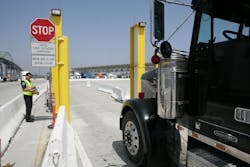Trucking may miss out on cross-border benefit due to ACE delay
The decision by the Customs Border Patrol (CBP) agency back in August to delay implementation of certain portions of its Automated Commercial Environment or “ACE” cross-border freight protocols until Feb. 28 next year won’t cause any problems for truckers.
However, it will push off a key benefit for industry within the ACE environment, argues Craig Seelig, product manager for customs and compliance for the Americas at transportation software firm WiseTech Global; namely, being able haul freight across the U.S.-Canadian border without being locked into a specific port of entry.
“For truck crossings into the U.S., ACE Cargo Release can have a real benefit – the ability to file for cargo entry without a port of crossing,” he explained to Fleet Owner.
“If a truck is diverted or ends up crossing the U.S. border at a different port of entry then entry originally filed for, that original entry had to be canceled via a paper process and a new entry filed electronically,” Seelig noted. “With ACE Cargo Release, that entry can be filed without the port of entry and CBP will use the port based on the electronic manifest [eManifest] filed by the trucker or agent.”CBP originally began its changeover to ACE and eManifests for truck shipments back at the end of 2006, but since then has found that shift to be slow going.
“We have seen areas where CBP can improve knowledge in the field to better support the trade when it comes to ACE issues,” WiseTech’s Seelig said. “As pilot programs are just starting up, we can see CBP and each PGA [partner government agency] working together to better understand each other’s processes. This delay presents CBP with a tremendous opportunity to better train their own personnel.”
He added that there’s been a lag on the part of many shippers and freight carriers, regardless of mode, in using ACE protocols as well.
“Many are not yet filing ACE entry summaries. As of July 2015, only 60% of entry summaries were being filed in ACE, and only 10% of cargo release was being filed in ACE Cargo Release,” Seelig noted. “About 25% of all filers in the U.S. have not even filed an ACE entry summary yet.”
For that reason, the new early 2016 deadline gives some relief to those that might have started late implementing ACE-compliant software.
“There are a large number of data elements that will be required to be entered on each invoice for a particular PGA, and that changes things,” Seelig pointed out. “For example, where a [freight] broker used to just pass on a form provided by the importer, this data now has to be provided to CBP electronically within the entry form.”
The good news for motor carriers, though, is that CBP has not added any other electronic requirements regarding freight bills/cargo checks at this point. “As carriers are not directly impacted, there should be little affect from the ACE delay,” he said.
Yet Seelig warned that freight companies – especially freight brokers and importers – should not be fooled into a false sense of relief now that ACE has been pushed back a few months.
“Don’t believe anything became suddenly easy,” he stressed. “In the big picture, the delay means almost nothing. It only gives a minor break to those who are a bit behind.”
About the Author
Sean Kilcarr
Editor in Chief
Sean Kilcarr is a former longtime FleetOwner senior editor who wrote for the publication from 2000 to 2018. He served as editor-in-chief from 2017 to 2018.

